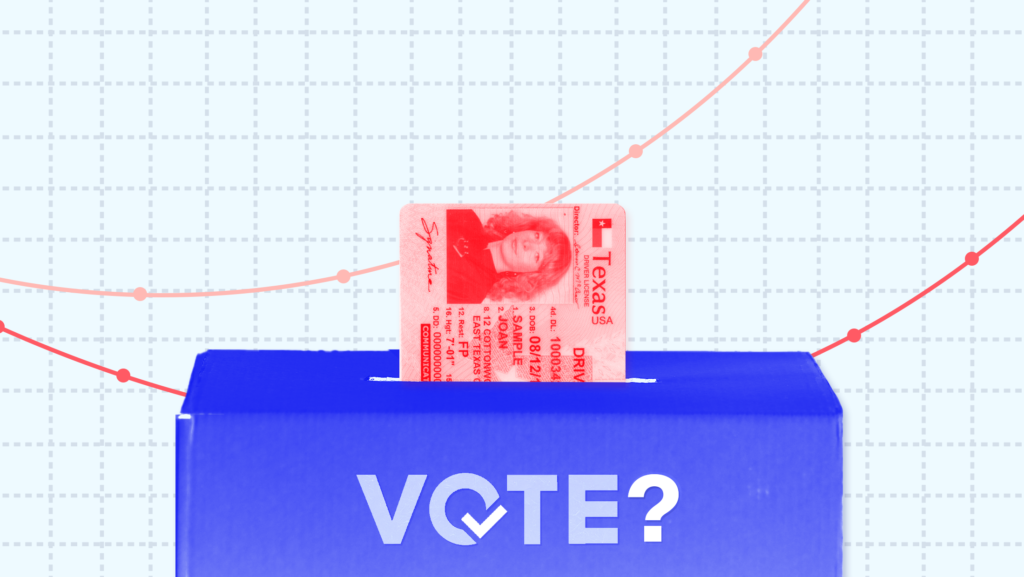Voter ID Laws Are Bad. But Whom Do They Impact the Most?

Perhaps the most controversial new election policies pursued by the states are voter ID laws, which require voters to present a photo ID at the polls in order to vote. Supporters of strict ID laws contend the laws are necessary to prevent fraud and ensure only eligible voters are voting, while critics point out that otherwise eligible voters may not have an acceptable ID and will be disenfranchised under these laws. But evidence about the impact of voter ID laws on voters is hard to come by, and it’s been difficult to determine exactly who and what kind of voters would be impacted by these laws.
Two political scientists in their recent paper “Who Does Voter ID Keep from Voting?” took advantage of a unique situation in Texas to answer this exact question. Texas had a strict voter ID law in place during the 2014 midterm elections, but a last-minute court ruling allowed voters who lacked the necessary identification to vote in the 2016 election as long as they completed a “reasonable impediment declaration” (RID), a form attesting why they did not have an ID, and presented another, non-photo form of ID like a birth certificate or a bank statement. The researchers use the 16,000 RIDs from the 2016 election to study the characteristics of the voters who would not have been allowed to vote had the law been in effect, allowing us to identify exactly who would have been barred from voting under this voter ID law.
Here are the key takeaways:
1. At least 16,000 Texans would have been disenfranchised in 2016
Based on the 16,000 RIDs, the authors conclude that, at the very least, these 16,000 voters would have been disenfranchised had the strict voter ID law been in effect for the 2016 election. However, 16,000 is likely a conservative estimate, as many voters without a valid ID may not have known about the option to vote with a RID and, thus, didn’t even try to vote. While this 16,000 baseline represents only 0.18% of ballots cast in Texas and may seem relatively small, it’s still many times greater than instances of fraudulently cast votes. Proponents of strict ID laws argue that these restrictive laws are needed to combat fraud, but when the amount of people disenfranchised is greater than the amount of fraud prevented, this suggests the harms of strict ID laws outweigh their benefits.
2. Non-white voters were more likely to vote without an ID — and thus more likely to become ineligible by a strict ID law
The 16,000 voters who voted in Texas without an ID in 2016 were disproportionately Black and Latino. Black voters were 54% more likely to vote without an ID than non-Hispanic white voters, while Latino voters were 14% more likely. This finding confirms other research that millions of Americans — especially Black and Latino voters — lack a photo ID and may be prevented from voting by strict ID laws.
3. Voters have a variety of valid reasons for not having an ID
When voting with a RID, voters had to state the reason why they were unable to produce a photo ID at the polls. The researchers found that for more than 33% of these voters, an enduring hardship — such as a disability or inability to obtain necessary documents like a birth certificate — prevented them from obtaining a photo ID in the first place. This finding matches popular theories that lack of identification poses real barriers to voting for otherwise eligible Americans.
However, the majority of the voters who filed RIDs in 2016 were deemed “ID capable” by the researchers, meaning they could probably obtain compliant identification at some point — such as voters who had lost their IDs or recently moved into the state. The researchers conclude this finding indicates that voters vote without an ID for various reasons unrelated to their eligibility to vote, and that some voters — those with enduring hardships — are more susceptible to disenfranchisement by strict ID laws than others.
4. Voters who voted without an ID in 2016 had much lower turnout in 2014
The voters who voted with RIDs in 2016 all had substantially lower turnout in 2014 when the ID requirement was in place, no matter their reason for not having an ID, supporting the key contention that voter ID laws not only disenfranchise voters, but also depress turnout when they are in place.
Despite the harms of voter ID laws, Republicans continue to push them in many states.
Critics of voter ID laws argue that requiring voters to present an ID when voting leads to disenfranchisement, with the burden disproportionately felt by Black and Latino voters. By leveraging a unique situation in Texas where they could identify exactly who would have been prevented from voting by a strict ID law, researchers largely confirmed these arguments. Voter ID laws likely do have a disproportionate impact on Black and Latino voters, and the negative impacts likely outweigh any benefit from preventing voter fraud. Unfortunately, Republicans continue to push for strict ID laws across the country. Activists in Michigan are gathering signatures to petition the Legislature for a strict voter ID law and North Carolina Republicans continue to defend their voter ID law in court. This study from Texas suggests voters will be harmed if they are successful.